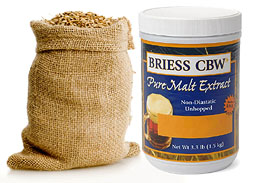 When it comes to brewing at home, you have two options: you can choose all-grain brewing, or you can choose extract brewing. If you’ve never done either before, you might be wondering which is the better of the two; and you might have already heard a number of arguments for each. So, which one is it?
When it comes to brewing at home, you have two options: you can choose all-grain brewing, or you can choose extract brewing. If you’ve never done either before, you might be wondering which is the better of the two; and you might have already heard a number of arguments for each. So, which one is it?
The debate is a difficult one, as both methods are perfectly valid and both deliver perfectly good beer. Which one you choose will largely depend on how much time you want to put into your beer making, and what kind of beer you’re looking for.
With all-grain brewing you place cracked malted barley, with water and cook (mash) it a specific temperatures over a period of time. This is a delicate process that needs to been done with great care. The liquid is then removed from the barley grains and boiled with hops.
With malt extracts on the other hand, you are skipping the cooking (mashing) part of the process. All that is need is that you pour the malt syrup in with water into a kettle and boil the mix (wort) and boil the hops in as before. No critical temperatures need to be followed. No grains need to be dealt with.
So which one is better?
Some beer brewers simply prefer one method over the other, just as cooks do in their kitchen. Those who prefer that everything be made “from scratch” will probably find more satisfaction in working with all grains, while those who would prefer to use mixes and a more hands-off approach might find malt extracts more convenient.
If you’re really picky about the type of beer you’re striving for, you might want to choose all-grain when you want a light, amber-colored beer with an all-malt Pilsner. However when the mood strikes for a bold stout, using malt extracts could possibly give you better results.
Another related blog post that you may want to take a look at is, “The 3 Different Methods Of Homebrewing“. It goes over the different ways that you can approach brewing your own beer at home.
________________________________________________________

